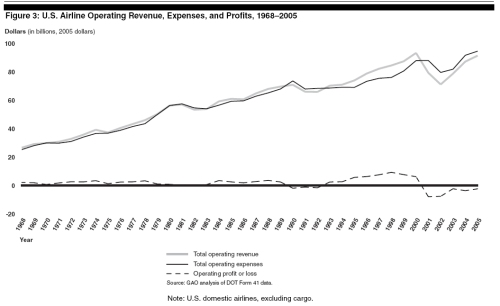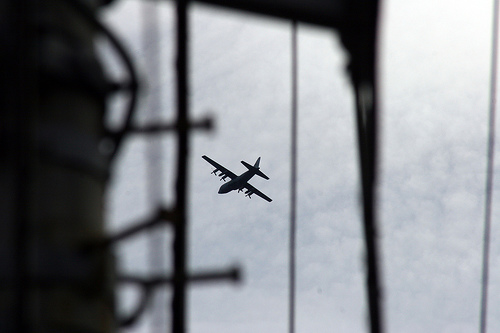As I see it, one of the problems of responding to climate change is the need for a response coordinated across industries and countries. Lots of industries like to trumpet what they are doing on their own to reduce their carbon footprints, but what if these reductions simply shift the climate change contribution onto another sector of the economy without reducing net impact? Case in point: aviation biofuels. Airbus and Boeing both affirm biofuels’ importance. Japan Airlines is running a biofuel test flight soon, and Air New Zealand will test biofuel made from jatropha, which meets its criteria of environmental sustainability without competing with food production, quality equal to today’s jet fuel, and significant cost savings. Much has been made of plans like benign megalomaniac Richard Branson’s to expand use of biofuels, not only to reduce emissions but also to save money:
Virgin’s much-ballyhood flight from London to Amsterdam used 5% coconut-oil biofuel . . . to show biofuel could take the high-altitude cold. But the test flight alone used 150,000 coconuts, Petroleum Review says—and at least 3 million would have been needed for a full biofuel flight. Multiply that by world air traffic, and the problem comes into focus.
The other options? Flavor-of-the-month jatropha biofuel would be fine—except aviation would require a land area twice the size of France to grow the stuff. . . . How about biomass, like bits of wood and useless plants? Well, they still need to grow somewhere—and commercial aviation would need to harvest an area three times the size of Germany.
My question: if aviation washes its hands of its climate change impact (estimated to be 2-3 percent) with biofuels, and since biofuels require more arable land and lead to the clearing of forested areas, how much does that add to deforestation’s estimated 25 percent contribution to anthropogenic climate change? The airline sector currently has no incentive to worry about this transfer of emissions, and every incentive (financial, PR, etc.) to just do it.
I’ve written before about a similar but not identical problem in “green taxation,” in which one country’s aviation taxes reduce one country’s aviation carbon footprint but not the world’s, because the flights shift to other countries’ airports. In the case of biofuels, will the airline industry be able to “greenwash” away its climate sins without actually making a difference in manmade CO2 emissions?
As for the extent to which widespread use of aviation biofuels will mitigate climate change, or what kind of policies or institutional structures can prevent this problem, I will leave further discussion up to those much better versed in this subject than I. Ahem, ahem.
Read Full Post »


Climate change and transportation subjects of today’s Senate hearing
Posted in Evan's Commentary, tagged congress, dot, environment on June 24, 2008|
Lots of interesting testimony at today’s Senate Commerce Committee hearing on climate change and transportation. Discussion subjects ranged widely, from surface transportation to the possibility of shipping in the Arctic. “The transportation sector accounts for approximately one-third of U.S. greenhouse gas emissions,” announced committee chairman Daniel Inouye (D-Hawaii). He added that GHG emissions from transportation are projected by the EPA to increase by 26 percent by 2020.
The first panel featured several government officials. Deputy Secretary of Transportation Thomas J. Barrett said that DOT is working to reduce greenhouse gas emissions — without compromising the “indispensable role” that transportation plays in the U.S. economy. He touted increased CAFE standards (only to be chided later by John Kerry [D-Mass.] for the administration’s foot-dragging on CAFE). Barrett emphasized the role of markets in the DOT’s transportation planning. “Markets provide strong incentives for improving efficiency,” he said. Market-oriented devices like runway slot auctions or highway tolling theoretically reduce congestion. Less congestion means less fuel consumed, which means fewer GHG emissions. Barrett spoke about a DOT’s across-all-modes experiments with “direct user fees and more congestion pricing.” For more information on these initiatives, along with some critical voices, see this WaPo article. “One study found that congestion pricing reduced emissions up to 10 percent in the aggregate and as much as 30 percent in high pollution areas.”
Barrett touted the airline industry’s sometimes surprising success in reducing emissions: “Aviation is a somewhat unheralded but real success story in these programs.” He urged Congress to exercise caution in “not hampering” the industry as it weighs GHG regulations. As for further improvements, Barrett claimed that the FAA is moving to accelerate its air traffic management improvements “to make it more NowGen than NextGen.” Some of these changes are already coming on line. (more…)
Read Full Post »